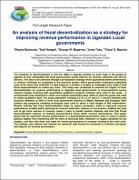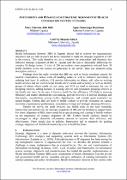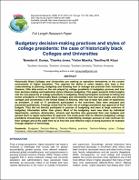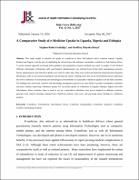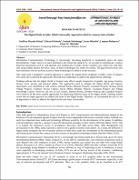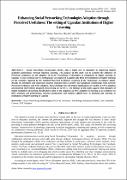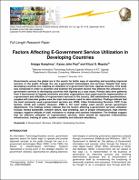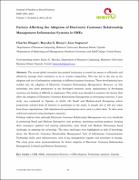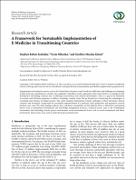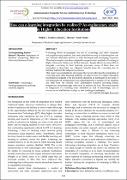Browsing Faculty of Computer and Informatics by Title
Now showing items 1-20 of 39
-
Alignment of information systems to strategy in the health sector using a systems dynamics approach
(2014)ABSTRACT Alignment of Information Systems with organizational objectives and strategy is a key factor for the success of information systems. However, most health facilities have not aligned their Health Information ... -
An analysis of e-learning information system adoption in ugandan universities: Case of makerere university business school.
(2012-04)This paper presents an examination of e-learning Information Systems failures and adoption problems in Ugandan universities based on Rogers and Shoemaker’s Diffusion of Technological Innovation Theory. Makerere University ... -
An analysis of fiscal decentralization as a strategy for improving revenue performance in Ugandan Local governments
(2014-04)The inception of decentralization in late the 1990s in Uganda instilled so much hope in the people of Uganda as they anticipated that local governments would improve on revenue collection and service delivery. This was ... -
Antecedents and dynamics for strategic alignment of health information systems in Uganda
(2014-06-01)Health Information Systems (HIS) in Uganda always fail to achieve the organizational objectives and yet little research has been conducted to study the strategic alignment of HIS in the country. This study therefore set ... -
Attitude and behavioral intention as mediators in adoption of E-tax services in ura, Uganda
(2016)The purpose of this study was to identify mediators of specific factors influencing adoption of e-tax system on URA, Uganda and design a customized model for its successful adoption. The research was conducted based on ... -
Budgetary decision-making practices and styles of college presidents: the case of historically black Colleges and Universities
(2014-05)Historically Black Colleges and Universities are seeking to reposition themselves in the current environment of higher education. This requires the ability to select leaders who have a firm understanding of planning, ... -
A comparative study of e-medicine uptake in Uganda, Nigeria and Ethiopia
(2017-05-06)This study sought to examine the uptake of e-medicine in three Sub-Saharan Africa countries namely; Uganda, Ethiopia and Nigeria, with the aim of establishing the salient factors that influence sustainable e-medicine in ... -
Critical parameters for the adoption of software capability maturity model by small and medium enterprises
(Inderscience enterprises ltd., 2016-01-01)The study involved a survey of Ugandan small and medium enterprises that develop software on critical factors influencing the adoption of software capability maturity model. The research examined the software development ... -
The digital divide in India: Which universality approach is ideal for gujarat state of India?
(2014)Information Communication Technology is increasingly becoming beneficial to humankind, given the latest developments. Today, there is so much potential to the extent that using ICTs, we are able to communicate, conduct ... -
Enhancing social networking technologies adoption through perceived usefulness: The setting of Ugandan institutions of higher learning
(2016-10)Social Networking Technologies (SNTs) play a major role in education by improving student academic performance through informal learning. The purpose of this study was to examine the influence of Perceived Usefulness on ... -
Examining health information systems success factors in Uganda’s healthcare system
(2014)Healthcare Health Information Systems offer several benefits towards healthcare service delivery in Uganda including easy record keeping, enhancing communication, performing simple calculations, supporting decision making, ... -
Examining the Effect of Facilitating Conditions as an imperative input in enhancing the intention to use Mobile Learning systems in Universities
(Global Journal of Computers & technology, 2017-03-21)This study centered on facilitating conditions as an imperative key in determining intention to use Mobile Learning systems in Universities. The study used a cross sectional survey with a sample size of 370 students from ... -
Factors affecting e-government service utilization in developing Countries
(2016-09)Governments across the global are in the search for better ways of operating and providing improved services to the public through the use e-government technologies and services. Despite that many developing countries ... -
Factors Affecting the adoption of electronic customer relationship management information systems in SMEs
(2014)The recent global recession has pushed businesses to search for means to efficiently and effectively manage their customers so as to remain competitive. This has led to the rise in the adoption and use of information ... -
Factors affecting the pricing of telecommunication products and services in Uganda
(2012-09)Improving universal access to telecommunications has become a very critical area of concern in both developed and developing countries in the recent past due to the huge contribution of the sub-sector to socio-economic and ... -
A framework for sustainable implementation of e-medicine in transitioning countries
(Hindawi publishing corporation, 2013-11-18)Organizations in developed countries such as theUnited States ofAmerica andCanada face difficulties and challenges in technology transfer from one organization to another; the complexity of problems easily compounds when ... -
A framework for the adoption of electronic customer relationship management information systems in uganda
(2013)This study proposes a framework for the adoption of Electronic Customer Relationship Management (e-CRM) information systems in Uganda. Both qualitative and quantitative research methods were used. Primary data were ... -
A framework for the integration of e-learning in higher education institutions in developing countries
(2013)The aim of this research was to design a framework for integrating e-learning in Higher Education Institutions in developing countries. Data were collected from 266 university students and staff of five universities in ... -
A framework for usability of e-government services in developing countries
(2015-11-17)The use of ICT in government activities has become a common phenomenon in recent years. In the late 1990s, information technological developments in the field of public administration culminated into the concept of ... -
How can e-learning integration be realized? An exploratory study in higher education institutions
(2013)E-learning, which encompasses the use of technology and other computer enhanced learning methods, has been identified one way of delivering low cost and efficient education service in both developed and developing countries. ...



